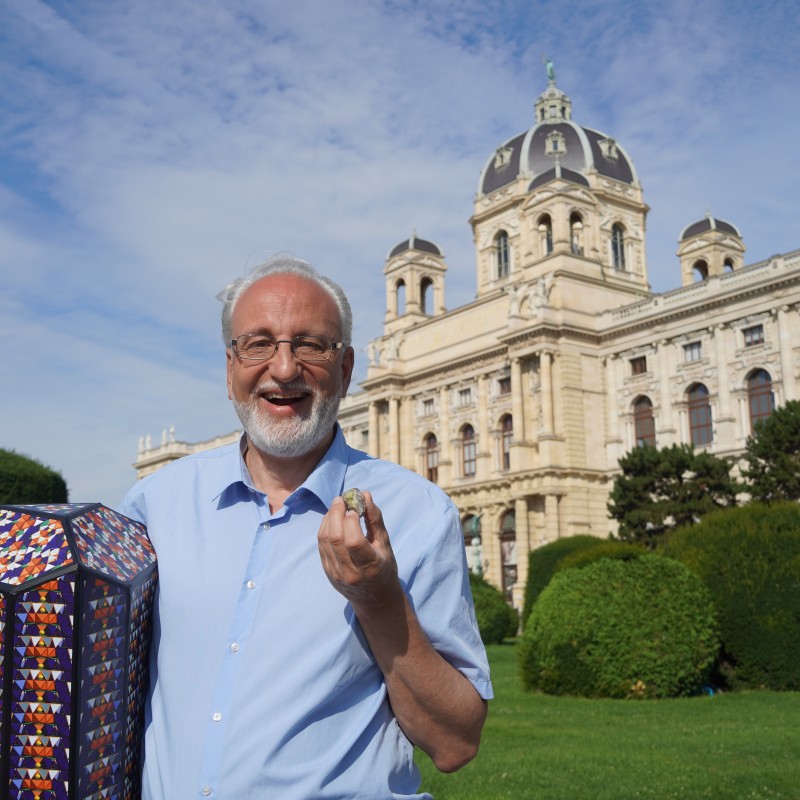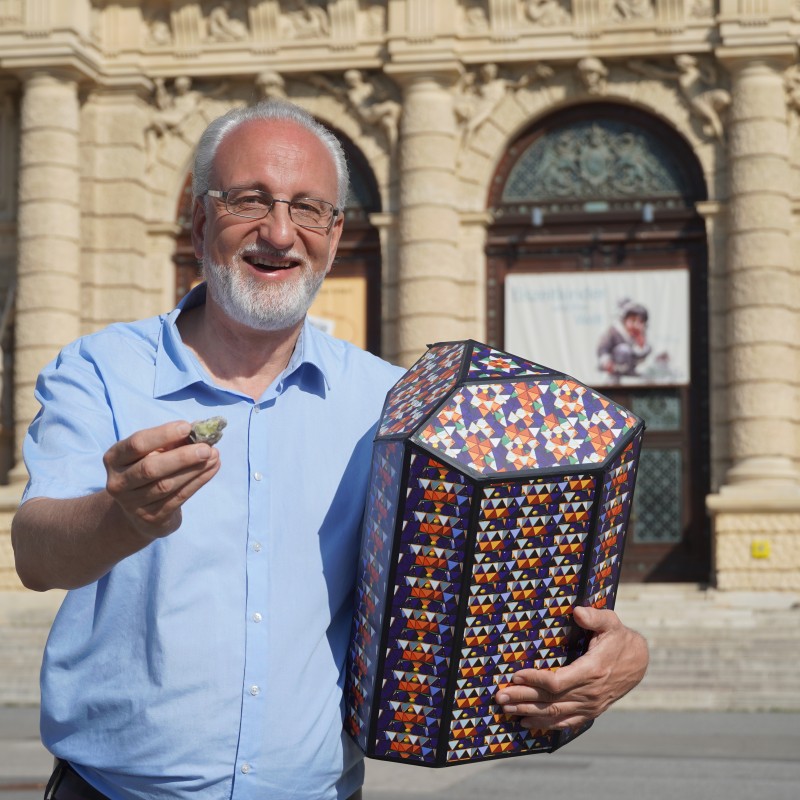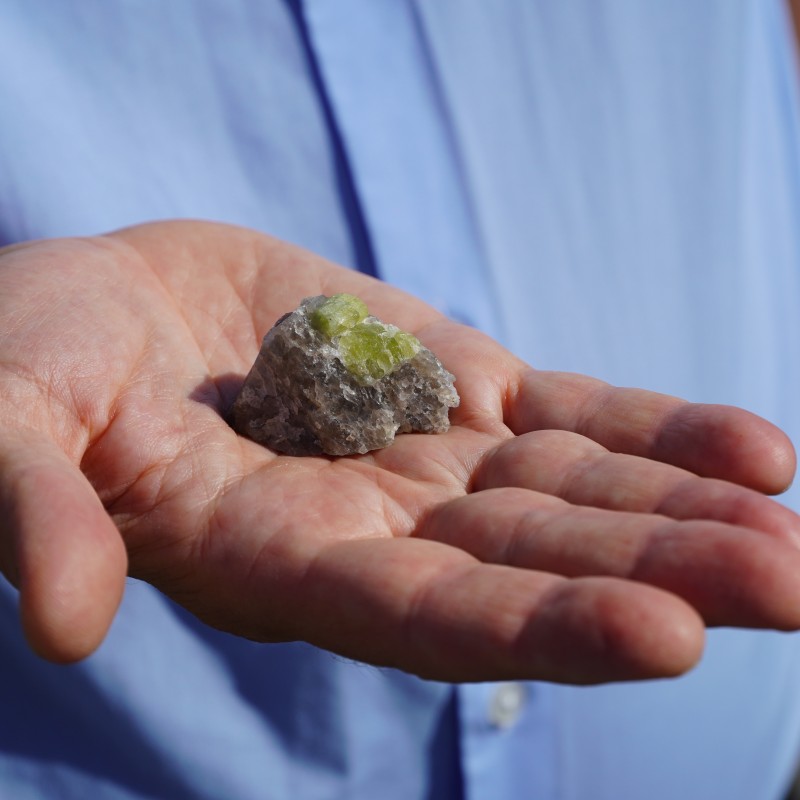New Mineral named "Ertlit" after Austrian
01. August 2025
A new mineral was recently
named after an FWF project leader, employed at the Natural History Museum Vienna. This new mineral belongs to the tourmaline
group. Tourmalines are used, among other things, as gemstones and for technical applications. The aluminum- and boron-rich
tourmaline ertlite was named after the internationally renowned mineralogist and crystallographer Dr. Andreas Ertl. Dr. Ertl
has been working on tourmalines for 30 years and has discovered and studied numerous new minerals himself.
Ertlite was originally described from Madagascar and Myanmar by an international team of authors. This team of authors includes
Dr. Uwe Kolitsch, the director of the Mineralogical-Petrographic Department of the Natural History Museum. He examined a tourmaline
consisting of spherically aggregated crystal aggregates. This tourmaline has also been confirmed as ertlite, and its chemical
composition is very close to the end-member formula of ertlite.
New minerals are usually inconspicuous and only visible under a magnifying glass. The new tourmaline Ertlite can be pink, yellow-brown, or colorless, and forms crystals up to 1 cm long, as well as round aggregates. What's special about this tourmaline is that it's the richest in boron in the world.
It was quite a surprise that the tourmaline ertlite now also occurs in Austria, specifically on the Koralpe in Styria. There, it forms crystals up to several centimeters long, which can be colorless, light green, or light blue. This shows that new discoveries can continue to be made in the Austrian Alps.
Hier ist der Link zum full length paper des neuen Turmalins Ertlit (Early Publication):
Cempírek, J. Jonsson, E., Skřápková, L., Škoda, R., Kolitsch, U., Čopjaková, R., Groat, L.A., Kampf, A.R., Lussier, A.J., Hawthorne, F.C., Haifler, j., Holá, M., & Ende, M. (2025): Ertlite, NaAl3Al6(Si4B2O18)(BO3)3(OH)3O, a new mineral species of the tourmaline supergroup. American Mineralogist, 110, 12, DOI: 10.2138/am-2025-9816
Link: https://pubs.geoscienceworld.org/msa/ammin/article/doi/10.2138/am-2025-9816/654751/Ertlite-NaAl3Al6-Si4B2O18-BO3-3-OH-3O-a-new
Hier ist der Link von der IMA Kommission (Ertlit auf S. 3 bzw. 527):
https://www.researchgate.net/publication/381726588_IMA_Commission_on_New_Minerals_Nomenclature_and_Classification_CNMNC_-_Newsletter_79
Referenz zu österreichischem Ertlit (pre-print):
Bačík, P & Ertl, A. (2025): How can Li be incorporated into the structure of Al-rich tourmaline? Mineralogical Magazine, DOI: 10.1180/mgm.2025.28
Link: https://www.cambridge.org/core/services/aop-cambridge-core/content/view/B49D942F498090B75952AD02583818CB/S0026461X25000283a.pdf/how_can_li_be_incorporated_into_the_structure_of_alrich_tourmaline.pdf
New minerals are usually inconspicuous and only visible under a magnifying glass. The new tourmaline Ertlite can be pink, yellow-brown, or colorless, and forms crystals up to 1 cm long, as well as round aggregates. What's special about this tourmaline is that it's the richest in boron in the world.
It was quite a surprise that the tourmaline ertlite now also occurs in Austria, specifically on the Koralpe in Styria. There, it forms crystals up to several centimeters long, which can be colorless, light green, or light blue. This shows that new discoveries can continue to be made in the Austrian Alps.
Hier ist der Link zum full length paper des neuen Turmalins Ertlit (Early Publication):
Cempírek, J. Jonsson, E., Skřápková, L., Škoda, R., Kolitsch, U., Čopjaková, R., Groat, L.A., Kampf, A.R., Lussier, A.J., Hawthorne, F.C., Haifler, j., Holá, M., & Ende, M. (2025): Ertlite, NaAl3Al6(Si4B2O18)(BO3)3(OH)3O, a new mineral species of the tourmaline supergroup. American Mineralogist, 110, 12, DOI: 10.2138/am-2025-9816
Link: https://pubs.geoscienceworld.org/msa/ammin/article/doi/10.2138/am-2025-9816/654751/Ertlite-NaAl3Al6-Si4B2O18-BO3-3-OH-3O-a-new
Hier ist der Link von der IMA Kommission (Ertlit auf S. 3 bzw. 527):
https://www.researchgate.net/publication/381726588_IMA_Commission_on_New_Minerals_Nomenclature_and_Classification_CNMNC_-_Newsletter_79
Referenz zu österreichischem Ertlit (pre-print):
Bačík, P & Ertl, A. (2025): How can Li be incorporated into the structure of Al-rich tourmaline? Mineralogical Magazine, DOI: 10.1180/mgm.2025.28
Link: https://www.cambridge.org/core/services/aop-cambridge-core/content/view/B49D942F498090B75952AD02583818CB/S0026461X25000283a.pdf/how_can_li_be_incorporated_into_the_structure_of_alrich_tourmaline.pdf





